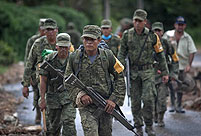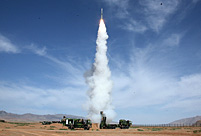Asia's richest man Li Ka-shing's recent sales of some his Chinese properties prompted jitters that other investors may pull out their money from China. However, several prominent overseas Chinese billionaires say they don't take Li's move as a warning and that they will invest more in China.
It has been reported that Li, a Hong Kong business mogul, sold a shopping plaza in Guangzhou and planned to cash in an office building in Shanghai. Li, the eighth richest person in the world on the Forbes list, could also possibly offload his ParknShop, a Hong Kong-based grocery chain.
Wang Shi, a real-estate tycoon in the Chinese mainland, warned that the decision by Li to sell was a signal to be wary.
However, Dhanin Chearavanont, a Thai Chinese and the 58th richest person in the world, said Li's selling was more of a usual practice. "I don't think he's exiting [China]," said the 74-year-old chairman of Charoen Pokphand Group on Thursday. "No matter which country chairman Li's investment is in, he sells if he becomes satisfied."
"I am enhancing my investments," Dhanin told Xinhua. "I visit China frequently. I first came to China 33 years ago, much earlier than he did. I'm very aware."
Dhanin's CP Group has invested nearly 6 billion U.S. dollars in China and built strong connections in business. His investments involved agriculture, retailing and real estate, including a 10-story shopping mall at the center of Shanghai's Lujiazui, China's Wall Street.
Dhanin's company last December paid HSBC about 9.4 billion U.S. dollars to buy a 15.6 percent stake in Ping'an, China's biggest private insurer.
"My purchase of Ping'an is a solid fact demonstrating my full confidence in the Chinese economy's future," Dhanin said. "The fortune of China remains good."
The economic slowdown, overcapacity and exposed financial risks like mounting government debt and runaway shadow banking prompted China bears to warn of a hard-landing and the popping of real estate bubbles.
But in the last two months, manufacturing and investment have recovered, reassuring the market that the country's official growth target of 7.5 percent will be achieved.
Mochtar Riady, a Chinese Indonesian financial magnate in Southeast Asia, said the Chinese economy is still moving upward and there are opportunities to invest. Riady said Li's selling was not a signal for others to pull out money.
Riady's Lippo Group has developed real estate projects across China, including a plaza towering on the core section of Huaihai Road, Shanghai's Fifth Avenue. Lippo owns and operates hotels, office buildings and shopping malls in cities including Beijing, Shanghai, Chengdu and Haikou.
"I am fully confident in China's economic growth," Riady added, saying the country's real estate prices will continue rising. The 84-year-old billionaire said the net worth of Xu Rongmao, a real-estate tycoon developing high-end properties in the mainland, would grow 10 times in 10 years.
Thomas Chua Kee Seng, president of Singapore Chinese Chamber of Commerce and Industry, does not regard Li's selling a signal that Asia's richest man has lost confidence in the region or an industry.
"With his powerful capital, Li can do things that others can't. Many things are cheap in Europe. Why can't he transfer some money to Europe and later invest the money he earns in China?" Chua said.
"Our confidence of investing in China has never dwindled," Chua added. "Certainly, every enterprise needs to consider the risks they can take." Li, chairman of Cheung Kong and Hutchison Whampoa, told Hong Kong press last week that his flagship companies would not pull their assets out. "After many years Cheung Kong and Hutchison will still be here," South China Morning Post quoted Li as saying.
 Storms leave 97 dead, 58 missing in Mexico
Storms leave 97 dead, 58 missing in Mexico New model of indigenous surface-to-air missiles testfired
New model of indigenous surface-to-air missiles testfired  118.28-carat diamond to be auctioned in HK
118.28-carat diamond to be auctioned in HK Maternal love under streetlight
Maternal love under streetlight Naked foreign student sits in the middle of a road in Haikou
Naked foreign student sits in the middle of a road in Haikou  Colorful Yunnan: Enjoy the natural beauty
Colorful Yunnan: Enjoy the natural beauty Harbin named Chinese city with most beautiful women
Harbin named Chinese city with most beautiful women New college students' military training in Guangzhou
New college students' military training in Guangzhou Rugby girls
Rugby girls PLA's 38th Group Army conduct training
PLA's 38th Group Army conduct training Residences of the royal house of Savoy
Residences of the royal house of Savoy The last days of Wan Aihua
The last days of Wan Aihua Highlights at 12th National Games of China
Highlights at 12th National Games of China Beijing Film Academy welcomes freshmen
Beijing Film Academy welcomes freshmen Large mahjong party sets new world record
Large mahjong party sets new world recordDay|Week|Month